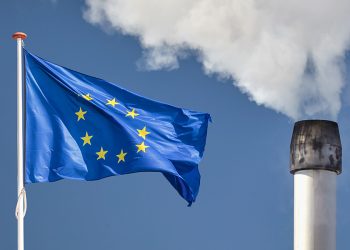DNV in their latest Maritime Forecast to 2050, evaluates various regulations and policies on the subject of shipping’s decarbonization.
According to DNV, 2023 has seen major decisions regarding GHG ambitions and regulations. The IMO has revised its GHG Strategy, strengthening the ambitions for international shipping. Furthermore, the EU has agreed to include shipping in its Emission Trading Scheme (EU ETS) from 2024 and on setting requirements on well-to-wake GHG emissions (FuelEU Maritime) from 2025.
DNV’s key findings from the IMO, EU, US and Chinese policies:
- 2023 has seen significant regulatory developments by the IMO, with the goal of reaching net zero by 2050, and by the EU, with new legislation. Policies in the US and China may impact the maritime sector globally.
- Well-to-wake greenhouse gas emissions and fuel sustainability credentials become important to avoid unintended emission increases in other sectors.
- Some shipping companies now offer net-zero emission services in response to cargo owners needing to decarbonize their operations.
- A book-and-claim system could speed uptake of carbon neutral fuels, enlarging the market by allowing those with no access to physical fuel products to buy reduction claims.
Regulatory developments
According to DNV, the decarbonization of shipping is expected to be driven by three key factors:
- regulations and policies,
- access to investors and capital
- cargo owner and consumer expectations.

These factors are supported by frameworks and standards specifying sustainability evaluation criteria, GHG emission calculation methods, and reporting requirements. DNV takes a look at how major organizations and countries approach the issue of decarbonization through their regulations:
#1 International Maritime Organization
The International Maritime Organization (IMO) has revised its Global GHG strategy, aiming to reduce well-to-wake GHG emissions by 20% in 2030, 70% by 2040, and 80% by 2050.
The strategy also addresses lifecycle GHG emissions from shipping, aiming to reduce emissions within the energy system of international shipping and prevent emissions shifting to other sectors.
To achieve these ambitions, the IMO will implement a technical goal-based marine fuel standard and an economic maritime GHG emissions pricing mechanism. The measures will be adopted in 2025 and enter into force in mid-2027.
Energy Efficiency eXisting Ship Index (EEXI) is well underway, and the last year has seen only minor updates on related guidelines. Recognizing the significant interest in the use of biofuels, the IMO also agreed that certified sustainable biofuels with at least 65% less well-to-wake GHG emission compared with fossil fuel can use a reduced CO2-emission factor under the Data Collection System (DCS) and CII.
However there are still several challenges with the Carbon Intensity Indicator (CII) – related in particular to ships with long period of waiting, port stay, and stationary operations – have been identified, but no further updates to the CII framework will be made at this time. The review of the regulation will be completed by the end of 2025.
#2 European Union
The European Union (EU) has set legally binding targets to reduce emissions by 55% by 2030 and become climate-neutral by 2050. This is seen as an opportunity to decouple economic growth from resource use and create opportunities for clean technology and solutions.
The Green Deal is a blueprint for achieving these ambitions, with the Fit for 55 legislative package proposed in 2021. Two pieces of legislation, EUETS and FuelEU Maritime, set specific requirements for ships.
Additionally, the EU has adopted a revision of the EU ETS, which includes shipping from 2026. This is an emission cap-and-trade system, with a cap reduced each year to align with the EU’s 2030 target. Ships above 5,000 gross tonnage must acquire and surrender emission allowances for their GHG emissions from 2024.
#3 United States of America
The US has not enshrined a climate target in its national laws, but when re-joining the Paris Agreement in 2021, it committed to a 50% to 52% reduction in net GHG emissions by 2030.
The US State Department and the White House have issued an along-term strategy aiming for net-zero emissions by 2050, focusing on investments in renewable energy production, reduced methane emissions, and increased natural and technological removal of carbon dioxide.
The US has also developed a roadmap for reducing emissions from the transport sector, including maritime, which outlines actions on research and innovation, international and domestic stakeholder engagement, infrastructure investment, and improved design and planning.
Furthermore, US works through the International Maritime Organization (IMO) to revise its GHG strategy to aim for phasing out GHG emissions from international shipping to zero no later than 2050. The US has several policy initiatives supporting renewable energy production, manufacturing advanced-technology vehicles, and maritime infrastructure development.
#4 China
China has set ambitious goals to peak carbon emissions by 2030 and achieve carbon neutrality by 2060, known as the ’30-60′ goals. The country’s multilevel government agencies are taking action to implement these goals in the shipping sector, including upgrading old ships, developing ships powered by electric power and LNG, promoting shore power usage, and advancing green, smart ships along coastlines and inland waterways.
The Ministry of Transport published the 14th Five-Year Plans, encouraging the use of new and clean energy, and a draft amendment to the Marine Environment Protection Law to reduce GHG emissions in the shipping sector. The government also encourages the Chinese shipping industry to promote green transformation through active exploration, innovation, and international collaboration.
China’s regulation on Energy Consumption Data and Carbon Intensity of Ships requires ships of 400 GT and above to report energy consumption data of their last voyage to the China Maritime Safety Administration. Moreover, China’s national Emission Trading System (ETS), which started operating in 2021 but covers power production only.
Alas, during MEPC 80 China opposed a carbon levy, on the idea that the levy will dramatically raise supply-chain costs and badly affect the world economy’s ability to recover.































































